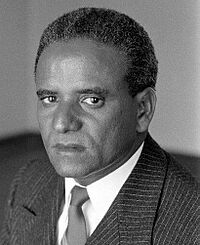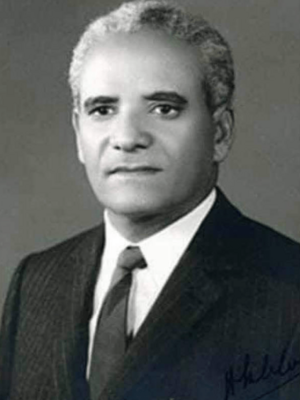Aklilu Habte-Wold facts for kids
Quick facts for kids
Aklilu Habte-Wold
|
|
|---|---|

Aklilu in 1961
|
|
| Prime Minister of Ethiopia | |
| In office 17 April 1961 – 1 March 1974 |
|
| Monarch | Haile Selassie I |
| Preceded by | Abebe Aregai |
| Succeeded by | Endelkachew Makonnen |
| Personal details | |
| Born | 12 March 1912 Bulga, Shewa Province, Ethiopian Empire |
| Died | 23 November 1974 (aged 62) Akaki Central Prison, Addis Ababa, Socialist Ethiopia |
| Political party | Independent |
| Spouse | Colette Valade |
| Alma mater | Paris-Sorbonne University (L.L.B) |
Aklilu Habte-Wold (Amharic: አክሊሉ ሀብተ ወልድ; born March 12, 1912 – died November 23, 1974) was an important Ethiopian politician. He served under Emperor Haile Selassie. Aklilu was Ethiopia's foreign minister from 1947 to 1958. Later, he became Prime Minister in 1961. He held this high position until his death in 1974.
Contents
Aklilu Habte-Wold's Early Life and Education
Aklilu Habte-Wold grew up in the Bulga area of Shewa Province. His father was a priest in the Ethiopian Orthodox church. Aklilu and his brothers, Makonnen Habte-Wold and Akalework Habte-Wold, were lucky. Emperor Haile Selassie helped them get a good education. Aklilu went to a French school in Alexandria. After that, he continued his studies in France.
How Aklilu Became Important in Government
When Aklilu came back to Ethiopia, he became a close helper to a powerful official. This official was called Tsehafi Taezaz Wolde Giyorgis Wolde Yohannes. Tsehafi Taezaz means "Minister of the Pen." Wolde Giyorgis was a very trusted advisor to the Emperor.
Wolde Giyorgis told the Emperor about Aklilu and his brothers. The Emperor then gave them important jobs. Aklilu and his brother Makonnen became very influential. The Emperor trusted them because they came from humble families. They owed their education and careers only to him. This meant they were loyal to the Emperor himself.
The Emperor often chose people like Aklilu, who were not from noble families, for high government jobs. This made some of the old noble families unhappy. They felt that these new, educated "technocrats" were taking their place.
Aklilu During World War II
During the Second Italo-Abyssinian War, Ethiopia was defeated. Aklilu Habte-Wold was in France at that time. When the head of the Ethiopian office in France left, Aklilu took over. He became the charge d'affairs, which means he was in charge of the diplomatic mission.
Aklilu lived in Paris and married a French woman named Collette Valade. When Paris was taken over in June 1940, Aklilu managed to escape. He used a fake passport and got help from the Portuguese Foreign Minister. He was able to reach Cairo.
After Ethiopia's independence was restored in 1941, Aklilu worked as a representative at the Peace conference after World War II. Then, he became the Foreign Minister. During this time, Aklilu played a big part in bringing Eritrea together with Ethiopia.
Aklilu's Time as Prime Minister
In 1958, the powerful official Wolde Giyorgis lost the Emperor's favor. The Emperor then chose Aklilu to take his place as Tsehafi Taezaz. In April 1961, Aklilu Habte-Wold was promoted to Prime Minister. This happened after the previous Prime Minister, Abebe Aragai, was killed in a failed attempt to overthrow the government. Aklilu kept both the Prime Minister job and the powerful Tsehafi Taezaz role. These two positions showed how much the Emperor trusted him. No one outside the Emperor's family had such trust.
Challenges During His Leadership
Aklilu's appointment meant more non-noble, educated officials (called "technocrats") gained power. This worried the older, more traditional groups. These included the Imperial Family, the noble families, and the Ethiopian Church.
Two main groups formed in the government. On one side were Prime Minister Aklilu and his fellow "technocrats." They controlled many government departments. On the other side were the noble families, led by Ras Asrate Medhin Kassa. Even though the Emperor did not allow political parties, these two groups acted like rivals. They often worked against each other. This rivalry stopped many important changes, like land reform and changes to the constitution.
Some historians believe Aklilu was more of a skilled government worker than a powerful leader. He was not as good at political games as some others. However, he was known for being a very clear and logical thinker. He was also a strong opponent in discussions with foreign representatives. But his close relationship with the Emperor also made him somewhat isolated from his peers.
The 1974 Revolution and Aklilu's Death
In 1973, there were many problems in Ethiopia. Students protested, soldiers rebelled, and the economy was struggling because of the oil embargo. These issues led to a big uprising against the government. People started demanding that Prime Minister Aklilu be removed from his position.
Aklilu himself was tired of his job. He had a lot of responsibility but felt he didn't have enough power. He decided to resign. Some important leaders tried to convince him to stay, but Aklilu insisted on leaving. He suggested that Lt. General Abiye Abebe should take his place. However, when Aklilu resigned, Endelkachew Makonnen became the new Prime Minister.
Aklilu's resignation did not calm the protesters. Instead, it made them demand even more changes. The Emperor appointed Lij Endelkachew Makonnen as the new Prime Minister. Endelkachew tried to meet the demands for reform. Ethiopia seemed to be moving towards becoming a democracy.
However, a group of lower-ranking military officers called the Derg took control. They were supposed to investigate corruption in the military. Instead, they arrested Tsehafi Taezaz Aklilu and most of the officials who worked in his government. They also arrested the new Prime Minister and his cabinet. On September 12, 1974, the Derg removed Emperor Haile Selassie from power. The Derg then became the new military government, ruling Ethiopia for nearly two decades.
On the evening of November 23, 1974, Aklilu Habte-Wold and his brother Akalework Habte-Wold were taken from the palace. They were brought to Akaki Central Prison. There, they were quickly executed along with 60 other former government officials. This event caused protests around the world. Many countries, including those in Europe, the United States, and Africa, expressed their concern.
Images for kids
 | Sharif Bey |
 | Hale Woodruff |
 | Richmond Barthé |
 | Purvis Young |




